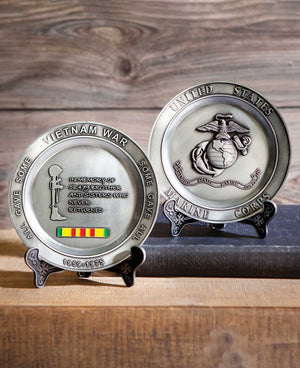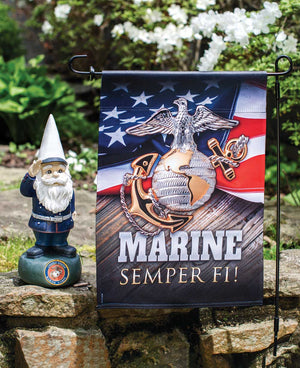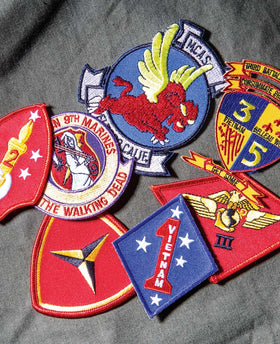Request a Catalog
Marines and the Bombings in Africa
An Account from Nairobi, Kenya and Dar es Salaam, Tanzania
Posted by Richard Gaines GySgt USMC Ret.
August 17, 1998 at 12:48:21:
FOR ALL, THIS IS WORTH MORE THAN A READ. A GREAT SUMMARY OF WHO AND WHAT WE ARE AS A CORPS. IF IT DOESN’T BRING A SHIVER TO YOUR SPINE AND THE HAIR ON YOUR ARM STAND AT THE POSITION OF ATTENTION, THEN….
Colonel Burgess,
This email has been slightly revised to include the incredible words which were voiced concerning the actions of our Marines during a meeting held this morning by the Charge d’ affairs in Dar es Salaam.
11 August, 1998
It has been almost 96 hours since the devastating blasts ripped through the American Embassies in Nairobi, Kenya and Dar es Salaam, Tanzania. With the situation at both embassies now somewhat stabilized, I want to take a few moments and attempt to paint a picture of the events leading up to the blasts as well as provide you with a commander’s perspective of the actions of our Marines subsequent to the explosions.
On Friday morning, 8 August 1998 at 10:30 am local Kenyan time (03:30 EST), Corporal Samuel Gonite was standing Post One in the American Embassy in Nairobi, Kenya. The detachment commander, Gunnery Sergeant Cross, was making his rounds throughout the embassy. At approximately 10:35, Marine Sergeant Jesse “Nathan” Aliganga walked into the embassy to cash a check. Corporal Gonite watched Sergeant Aliganga walk past Post One, get onto the elevator, and ascend to the bank.
At the same time and unbeknownst to anyone in the embassy, two men pulled up to the rear guard shack of the embassy, which was manned by the local Kenyan security force. This parking lot, which was sandwiched in between a 60 story bank building and a smaller bank building, was also the entrance into the underground garage for the embassy. Reportedly, a man approached the local guard and demanded he open the gate (leading into the embassy’s underground garage) to which the local guard refused. At this time, the man hurled what was believed to be a grenade in the direction of the guard.
Inside the embassy, people heard the explosion and reportedly got up to look out of their windows when at 10:40 am, a truck filled with explosives crashed into the rear wall of the embassy adjacent to the underground garage, and exploded. The only Marines on duty at the time of the blast were the detachment commander and Corporal Gonite, who was immediately knocked to the ground by the concussion of the blast. The glass surrounding Post One was shattered but remained in tact. The detachment commander, upon hearing the first blast, immediately took cover in the ladder well and was shielded from the main blast. The Chancery was in shambles.
When the truck exploded, the small bank building behind the embassy collapsed onto the chancery’s emergency generator, spilling thousands of gallons of diesel fuel into the basement of the embassy. The diesel fuel ignited and smoke and fire were billowing throughout the embassy. As injured and confused people were running out of the chancery screaming and choking, the Marines were running into the building looking for survivors. With no thought for their own lives, having no idea what else may happen, or whether or not the shattered structure would cave in on them, the Marines immediately reacted and began a sweep of the building.
Sergeant Briehl, who was waiting outside the embassy in the car, immediately darted into the building looking for Sergeant Aliganga. He ran to the elevator shafts behind post one, which were completely destroyed, and fell two floors down into the shaft, breaking three ribs and sustaining multiple lacerations and bruises. Sergeant Briehl managed to climb out of the elevator shaft and continued his search for Sergeant Aliganga. Sergeant Outt, who was in Nairobi from Bujumbura for a dental appointment, as well as Sergeant Harper, who was on COT leave in Nairobi from Accra, immediately reacted with the Marines and manned posts around the embassy.
At this time, we had Gunnery Sergeant Cross, Sergeants Russel, Jiminez, Briehl, Outt, Harper, and Corporal Gonite on board. These Marines immediately made their way through the rubble, fire and smoke looking for survivors, fended off local looters who swarmed the embassy moments after the blast, secured classified material, and most importantly to them, beganthe search for their brother, Sergeant Aliganga.
To provide a bit of situational awareness, the embassy in Nairobi is a seven floor concrete structure with five above ground and two below ground levels. It was situated on two major avenues of approach with minimal stand off distance between the road and the structure. When the bomb exploded, the force of the blast was so devastating that it blew out almost every closed window and frame on the building. Twelve inch thick concrete walls on all floors of the embassy were shattered like thin plates of glass. Solid wooden doors mounted on steel frames were sent airborne landing throughout the structure. Windows on office buildings over a quarter of a mile away were shattered. There was not an office space that survived inside of the embassy. Bodies were spread all over, most of which were buried under up to eight feet of rubble.
At the same time, the Regional Security Officer for the American Embassy in Dar es Salaam, Tanzania, John DiCarlo, a former Marine Security Guard, had taken post one from Corporal Johnson in order for him to make a head call. At approximately 10:40 am, a truck bomb exploded outside the security gate, ripping through the embassy. Corporal Johnson was knocked to the deck. He stood up, and immediately ran to Post One where he found it intact, but inoperable. Corporal Johnson immediately reacted the Marines, which were all at the Marine BEQ during the explosion, and informed all mission personnel to evacuate the building. Corporal Johnson donned his react gear and took control of the Command Center.
The detachment commander, Gunnery Sergeant Kimble, arrived at the Embassy approximately 4-5 minutes after the blast and began checking offices throughout the chancery to insure all personnel were safely out of the building. One of the casualties of the explosion was Gunnery Sergeant Kimble’s wife Cynthia, who sustained bruises and eye injuries from flying glass. While Cynthia was flown to London to receive eye surgery, Gunnery Sergeant Kimble never lost focus on the mission at hand. Within eight minutes of the blast, Sergeant Sivason, and first poster’s Corporals Bohn, Hatfield, Johnson, and McCabe began working through the chancery clearing all rooms of personnel. No direction was required as each Marine knew exactly what had to be done. Keep in mind that numerous secondary explosions (which turned out to be fuel tanks in automobiles) were occurring all around the compound as Marines continued to sweep the building. For a period of time, they had no idea if the embassy was actually being assaulted or overrun.
Due to the enormous amount of smoke and fire raging throughout the chancery and near the underground fuel tanks, the decision was made to evacuate Post One and the Marines fell back to their secondary positions. Corporal Johnson took security for the mission personnel at the rear of the Embassy, and all other Marines took up perimeter security around the building. The force of the blast blew out every window in the chancery, and all doors except post one. The hardline doors, which are located on the opposite side of the embassy, were forced open by the blast. Emergency fire exits on the opposite side of the building in which the blast occurred were blown off the hinges. Concrete walls within the Embassy were knocked down and safes were moved and in some cases knocked over. During the search of the building the Marines had to bust through walls in order to get to areas unattainable during their sweep. Within four hours of the truck bomb, which damaged diplomatic properties and houses up to 1000 meters away, the embassy was secure with MSGs maintaining 24 hour security on the building until the arrival of the FAST team.
In Nairobi, Marines continued to work throughout the day clearing the embassy, providing local security (as the local constabulary proved worthless), moving the injured and the dead from the rubble to safety. The condition of many of the dead was horrific, making the task of search and rescue that much more difficult for all concerned. By 03:00, I arrived on the scene with my XO, 1stSgt, and admin chief, all of whom had been stationed in the Nairobi embassy for over a year and knew the ground, and two MSGs from the Pretoria Detachment, who quickly took up posts around the embassy.
By 04:00, a number of Army special forces NCOs had volunteered to stand post to give the Marines a much needed break.1StSgt Guzman took the post from the detachment commander and I ordered the Marines home to shower and sleep. At first light, all of the Marines were back to continue their Mission while looking for Sergeant Aliganga. After hours of digging by hand through tons of rubble, behind Post One and in the elevator shafts, we moved to the area of the bank. This was one of the hardest hit areas as it was one floor up and only about 50 feet from the blast site. Twelve inch slabs of reinforced concrete were piled up to the ceiling, while desks, computers, and file cabinets were reduced to scrap. The Marines and Army S/F personnel, along with DOS personnel worked frantically against the clock. By this time, over thirty bodies had been recovered from the rubble, including ten Americans.
Finally, at exactly 14:30 local time, after 27 hours and fifty minutes of relentless digging with their bare hands, the body of Sergeant Aliganga was recovered from the rubble. Once positively identified, the Marines then gently wrapped Sergeant Aliganga in the American flag, and very purposefully marched him through the rubble and out of the embassy to the waiting vehicle. Although there were no cameras present, nor was there any music playing, the crowds seemed to still, and people stood erect, with tears running down their faces, as the body of another United States Marine, who gave his life in defense of his country, was ushered away.
By nightfall, the FAST team arrived and quickly took up the perimeter security of the embassy, freeing the MSGs to return to the still ongoing task of recovering classified material and equipment from the rubble. Sir, I apologize that my words are insufficient to more accurately describe the true essence of this horrific tragedy. What must not be missed is the incredible bravery and heroism displayed by our Marine Security Guards. Without any regard for their own lives or safety, they maintained incredible presence of mind in the face of tremendous devastation. Each Marine continued to serve our country and our Department of State with distinction. Even through the chaos and the fog, our Marines never lost focus of their mission. They were models of strength to be emulated by all.
During a meeting this morning called by the Charge d’ affairs in Dares Salaam who assembled the Marines together to personally recognize them for their heroism, the following statement was made, “The Marines are to be commended for how exceptionally well they performed their duties under extreme conditions of chaos and terror. Their bravery and heroism was displayed in such a confident and purposeful manner that their very presence transferred to others, allowing them to get through the situation.” Please keep in mind that we are talking initially about only six Marines. Four corporals with less than five months on the MSG program; one supply admin clerk, one communicator, one tank crewman, and a canvass repair specialist, an 0311 Sergeant and a Gunnery Sergeant who is a legal chief. This situation brought true meaning to the fact that every Marine is a rifleman.
As you finish reading this synopsis, the Marines from Nairobi and Dares Salaam, augmented by Sergeant Harper from Accra, Sergeant Lawlor from Bonn, Sergeant Outt from Bujumbura, Sergeant Boudah from Dublin, Corporal Graff and Sergeant Wolf from Frankfurt, Sergeant Salizar from the Hague, Sergeant Alberto and Corporal Durden from London, Sergeant Jackson from Paris, Sergeant Smith and Corporal Cornell from Pretoria, and Sergeant Reynolds from Rome, are manning makeshift embassies as our MSGs continue to support our Department of State. They have not missed a beat and will continue guarding Americans and America’s interests abroad, as Marines have done for over 222 years.
Semper Fidelis and Very Respectfully,
Dennis G. Sabal
Lieutenant Colonel, U.S. Marine Corps







Leave a comment